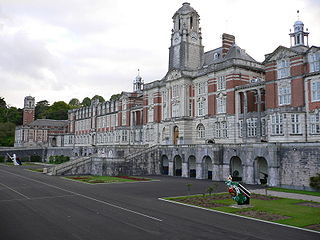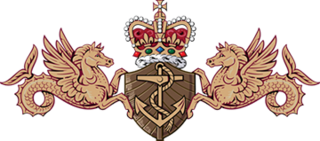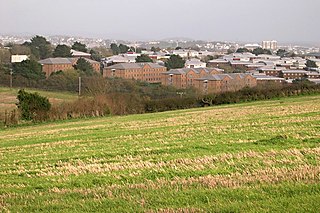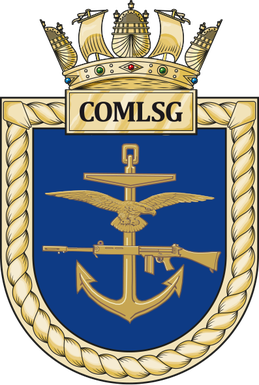
Britannia Royal Naval College (BRNC), is the naval academy of the United Kingdom and the initial officer training establishment of the Royal Navy. It is located on a hill overlooking the port of Dartmouth, Devon, England. Royal Naval officer training has taken place in Dartmouth since 1863. The buildings of the current campus were completed in 1905. Earlier students lived in two wooden hulks moored in the River Dart. Since 1998, BRNC has been the sole centre for Royal Naval officer training.

The Gibraltar Squadron is a unit of the British Royal Navy. It is the only seagoing Royal Naval unit based in Gibraltar, attached to British Forces Gibraltar. It currently includes two Cutlass-class fast patrol boats with a maximum speed of up to 41-knots. The squadron also uses three Pacific 24 rigid-hulled inflatable boats and deploys one diving support boat. The 2021 defence white paper indicated that henceforth, one River-class offshore patrol vessel, HMS Trent, would also be permanently based in Gibraltar for operations in the Mediterranean and in the Gulf of Guinea. As of 2023, 28 personnel were assigned to the squadron, along with additional personnel assigned to HMS Trent.

HMS Tamar was the name for the British Royal Navy's base in Hong Kong from 1897 to 1997. It took its name from HMS Tamar, a ship that was used as the base until replaced by buildings ashore.

The Royal Navy Surface Fleet forms one of the five fighting arms of the Royal Navy.

HMS Raleigh is a stone frigate, serving as the basic training facility of the Royal Navy at Torpoint, Cornwall, United Kingdom. It is spread over several square miles, and has damage control simulators and fire-fighting training facilities, as well as a permanently moored training ship, the former HMS Brecon. Its principal function is the delivery of both New Entry Training and Basic Training.

British Forces Gibraltar constitute those elements of the British Armed Forces stationed in the British overseas territory of Gibraltar. Gibraltar is used primarily as a training area, thanks to its good climate and rocky terrain, and as a stopover for aircraft and ships en route to and from deployments East of Suez or in Africa.

The Fleet Operational Standards and Training (FOST) is a Royal Navy training organisation. FOST is the training organisation responsible for ensuring that Royal Navy and Royal Fleet Auxiliary vessels are fit to join the operational fleet.

The Navy Command is the current headquarters body of the Royal Navy, and as of 2012 its major organisational grouping. It is a hybrid, neither a command, nor simply an installation. Royal Navy official writings describe Navy Command Headquarters both as a physical site, on Whale Island, Hampshire, a collective formed of the most senior RN officers, and as a budgetary grouping.

The Commander Operations (COMOPS) is a senior Royal Navy officer based at Northwood Headquarters who exercises operational command of all national maritime operations on behalf of the Fleet Commander. The post was established in 1993.
UK Maritime Component Command (UKMCC) is a Royal Navy Command located at HMS Jufair in Bahrain.

The Admiral Commanding, Reserves, was a senior Royal Navy post that existed from 1875 to 1976.

The Flag Officer, Royal Yachts, (FORY) also styled Flag Officer Commanding Royal Yachts was a senior Royal Navy post that existed from 1884 to 1997.

The Assistant Chief of the Naval Staff (Capability) is a senior Royal Navy appointment responsible he is accountable for planning and delivering the larger part of future maritime effectiveness; he does this on behalf of the First Sea Lord.

The Assistant Chief of the Naval Staff (Personnel) is a senior Royal Navy appointment responsible for the sustainable delivery of sufficient, capable and motivated personnel to the Naval Service in support of Defence Outcomes; he does this on behalf of the First Sea Lord and Chief of the Naval Staff. It has now subsumed under Director People and Training.

The Commander United Kingdom Task Group (COMUKTG ) was a senior Royal Navy operational appointment from April 1992 to March 2015. In March 2015 the post was renamed Commander Amphibious Task Group.

The Commander Littoral Strike Group (COMLSG) is a senior British Royal Navy Amphibious warfare appointment. COMLSG, who is based in Stonehouse Barracks, Stonehouse, Plymouth, reports to Commander United Kingdom Strike Force. It was first established in 1971 as Commodore Amphibious Warfare.

The Commander United Kingdom Carrier Strike Group, (COMUKCSG) is a senior British Royal Navy appointment which commands the UK Carrier Strike Group. COMUKCSG, a Commodore, commands a total of 65 personnel, and is headquartered at HMNB Portsmouth.

The Chief of Staff Navy Command (HQ) is a senior Royal Navy appointment is the principal staff officer responsible for coordinating the supporting staff of Navy Command Headquarters, Portsmouth, England. The office was established in June 2010.

The Naval Staff Directorate is a military staff directorate created in 1985 as the Directorate of Naval Staff Duties. The directorate was originally part of the British Ministry of Defence and is now under the Ministry of Defence as part of Navy Command. It is currently administered by the Commodore Naval Staff now based at MOD HQ.

The Chief of Staff, Mediterranean Fleet also formally known as Chief of Staff to the Commander-in-Chief Mediterranean Fleet and originally called Flag Captain, Mediterranean Fleet. was a senior British Royal Navy appointment. He was the commander-in-chiefs primary aide-de-camp providing administrative support from October 1893 to 1967.










